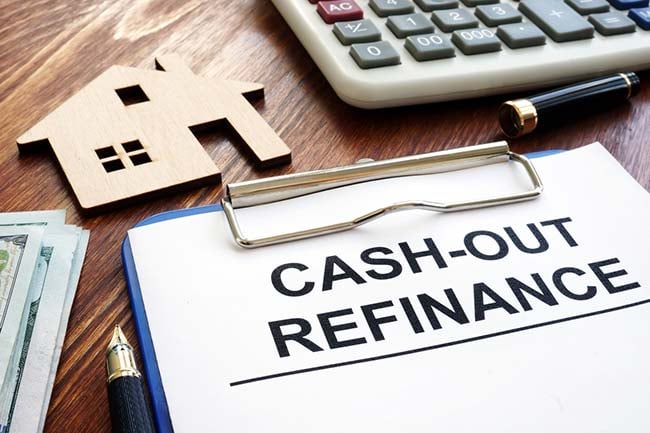
As a real estate investor, there could be times when you find you might need more cash than what your revenue streams can provide. Maybe you want to make improvements on your current properties. Or, perhaps, you want to buy additional assets to expand your portfolio.
To obtain the funds for repair, extension and expansion, you could:
- Apply for a new loan
- Find an equity partner
- Consider cash-out refinancing
Pros and cons exist for all the above options. But, under the right conditions, cash-out financing could potentially help you obtain equity in the form of cash from properties you already own, and put it to work.
Not Refinance, But Cash-Out Refinance
First, let’s define what, exactly, we mean by cash-out refinancing. Put simply, the process involves obtaining enough debt to pay off the current loan on your property, as well as getting extra cash based on that property’s equity.
So, does cash-out refinancing differ from regular refinancing? Yes, and here’s how.
Refinancing involves procuring a new loan for an asset, with the goal of replacing current debt. A cash-out refinance, also known as a cash out mortgage, or mortgage refinance, actually pays off the property’s entire loan, and provides you with some extra cash along the way. The result is a higher levered property and a decrease in one’s equity stake, but also more cash in hand.
When Cashing Out Works
Using your equity to access tied up cash and expand your portfolio is one cash-out refinance benefit. Another benefit – you could potentially come away from the transaction with a lower-interest-rate loan.
The cash-out mortgage process is also a great tool if you’re participating in a 1031 Exchange. If you’ve read our previous blogs, you know that in a like-kind asset exchange, you are not allowed to control exchange funds either directly or indirectly. If cash ends up in your account during the exchange process, the taxes aren’t deferred, and you have to pay them. That’s why a qualified intermediary, or QI, is essential for a 1031 Exchange.
But, the cash-out refinance process allows you to pull money out of the property you exchanged into. As long as you own that property for at least six months following the exchange, you can find new debt, tap into the asset’s equity, and likely not face scrutiny from the IRS for doing so. Note, however, that this only applies to direct property. In the scenario that you are invested in a syndicated real estate investment, such as a Delaware Statutory Trust, the cash-out will need to be apart of the Sponsor’s business strategy since everyone in the trust must have the same economics. Cash-out features are deal specific, and the Sponsor will likely make investors aware that it plans on deploying this strategy.
One caveat here is that the IRS hasn’t yet developed specific rules covering cash-out refinances on exchange assets. So, before you happily begin cashing out on your exchange property, be sure to talk to a CPA or tax attorney.
The main goal of a cash-out refinance is help fund other long-term investments or obligations by releasing funds tied up in a rental or investment property. That lump sum payment you receive from cashing out your mortgage could help you buy additional properties, or improve the ones you already have.
What to Watch Out for
Are you risk-averse? Then don’t cash out.
Doing so means you’re taking on more debt. Sure, you’re getting the extra cash, but if your property’s value declines, you could end up paying more to the lender than what the property is worth. Furthermore, because you took out equity on the property, you’ll have little – or any – left.
Speaking of equity, you should have a fair amount of it wrapped up in your asset to make the mortgage refinance process worthwhile. The general rule of thumb for cash-out refinancing is that the asset’s equity should be, at minimum 30%.1
Finally, because underwriting is notoriously strict for a cash-out refinance, your FICA credit score has to be stellar, typically between 620 to 640. Most home equity loans will require a credit score of 680.1
It’s true that this financial tool is not for everyone. If, however, you’re able to meet the above requirements, the cash-out refinance could be helpful for pulling tax-deferred equity out of your property, while possibly providing you with a lower mortgage rate. Call us at (877) 797-1031 to learn more about how a cash-out refinance could be a useful wealth planning solution.
- Retrieved from https://thelendersnetwork.com/cash-out-refinance-loans/



